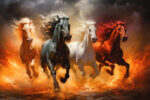Carol Johnson
-

Saving Stories
Can Christian fiction help rescue our nation?

This year finds our country in increasingly chaotic circumstances—devastating unemployment, progressively angry political divisions, huge moral leadership gaps and destructive warring factions around the globe. Each night the dreary headlines blaze across television screens and the front pages of the newspaper. Yet we also are a nation most blessed, with freedoms and material prosperity unimagined in most countries of the world. For the most part, even our politicians are honest and out for the country’s good—how astonishing is that compared to so many other nations? The question is this: How are we to sort through, think about and address the problems—personal and national—that, along with our blessings, dog our days?
Maybe novels are being written right now or are already out there that can provide new direction, new ways of thinking, and answers to the questions and trials that seem to consume us. The majority of fiction is written and bought for entertainment value, and a well-crafted story certainly will have “refreshing diversion” as foundational to the reading experience. But the most memorable and long-lasting fiction also has the potential to fire the imagination, inspire and challenge readers toward new approaches to the complications, difficulties and yes, evils of life.
This has been the case down through history. In America, the best-known fiction game-changer is Harriet Beecher Stowe’s Uncle Tom’s Cabin. Her strong faith, along with the influences of her theologian father and abolitionist husband, is woven throughout this novel of slavery’s terrible wound on a nation’s soul. An unprecedented 300,000 copies were sold during its first year in print as a complete book (it was originally featured in newspaper serials of the time). The book’s sales soon surpassed a million copies—at a time when the entire population of the country was barely over 30 million—and stirred citizens’ hearts and minds to action. It has been reported that during the author’s visit to the White House, President Lincoln mused, “So you are the little woman who wrote the book that started this great war.”
Recent Posts
- Do American Students Suddenly Have Compassion for Palestinians’ Plight?
- Liberty Students Honor God in Massive Event as Antisemitism Sweeps Colleges
- White Horse Covered in Blood Roams London, Igniting Prophetic Speculation
- Mandisa’s Father Does Not Think Death is From Self-Harm
- Russell Brand is ‘Grateful’ to be in Christ After Baptism




